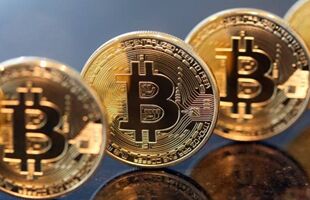比特币狂热的背后
|
As the price of bitcoin hit $10,000, the cryptocurrency’s supporters took to Twitter last week to boast of their triumph. “You, a Wall St trader: spent years in school learning the minutia of finance, 10 years of 100-hour work weeks, never see your family, super excited about your 10 per cent returns this year,” one enthusiast wrote. “Me: a Bitcoiner: read some books, s*** posted on Twitter, ate some steaks, enjoying 900 per cent returns.” This trolling social media comment perfectly captures the mutual disdain between professional financiers, who have mostly watched bitcoin’s rise with a mixture of puzzlement and horror, and the hardcore of true believers who view owning cryptocurrencies as a disruptive act of financial iconoclasm.
Those who are trying to explain bitcoin’s popularity and behaviour through the spectacles of mainstream finance are committing a simple analytical error: they are attempting to apply fact-based analysis to an asset that is impervious to it. Bitcoin is a faith-based financial asset for a populist era. Speculative manias have occurred throughout history. The study of bubbles has greater value in informing us about the state of the societies in which they occurred than any lasting financial lesson. The Tulip bubble in the Netherlands occurred during the Dutch Golden Age, when the country was the world’s leading economic and social power, and the ability of an investment to defy gravity was easy to believe. Bitcoin’s price is not being driven by anything resembling conventional financial logic, but in part by the same forces that have delivered the political shocks of the past two years. Like populist politics, belief in cryptocurrencies and “trustless networks” have chimed with a collapse in confidence in traditional forms of authority and a disdain for experts. Unwavering belief in bitcoin’s story is powered by the crowd-fuelled authority of the internet. Financial professionals who fail to comprehend why someone would risk their wealth investing in bitcoin when it appears to them so obviously to be a bubble can be compared with the political analysts who believed it was impossible the UK would vote to leave the EU. The global financial crisis severely discredited the banking system. In the world of investment there has been a breakdown in confidence that expert professional investors and advisers know what they are doing. The rise of passive investment is occurring at a time of criticism of years of excessive fees and poor performance of the mutual funds that millions are relying on to fund their retirement. When an expert such as Jamie Dimon, the head of the largest bank in the US, warns that bitcoin is dangerous, crypto true believers regard such warnings with the same disdain directed at experts ahead of the UK referendum. Like bitter political spats on Twitter, any criticism of bitcoin is greeted by this cohort as inherently corrupt in its motivations, while any alternative opinions are used as evidence that merely confirms existing beliefs. Sceptical financial professionals appear to similarly underestimate what can be seen as a millenarianism devotion that inures them to the conventional psychology of investment: the fear of losing money. The most dedicated of bitcoin supporters — those who refer to themselves as HODL-ers, or those who will hold on whatever happens to the price — see their survival of previous crashes in its value as a point of pride. The devout hold the value and future of bitcoin is a matter of faith, a Manichean battle between believers and sceptics. To this most extreme acolyte there is noble glory in the act of owning bitcoin, even if it results in a debilitating loss. Vast amounts of attention will inevitably be devoted to the wild swings in the value of bitcoin in the coming weeks. Decades from now — whether bitcoin still exists or not — it may be that its significance is seen less as a financial asset and more as a speculative barometer of the political forces that are shaping our times. |









